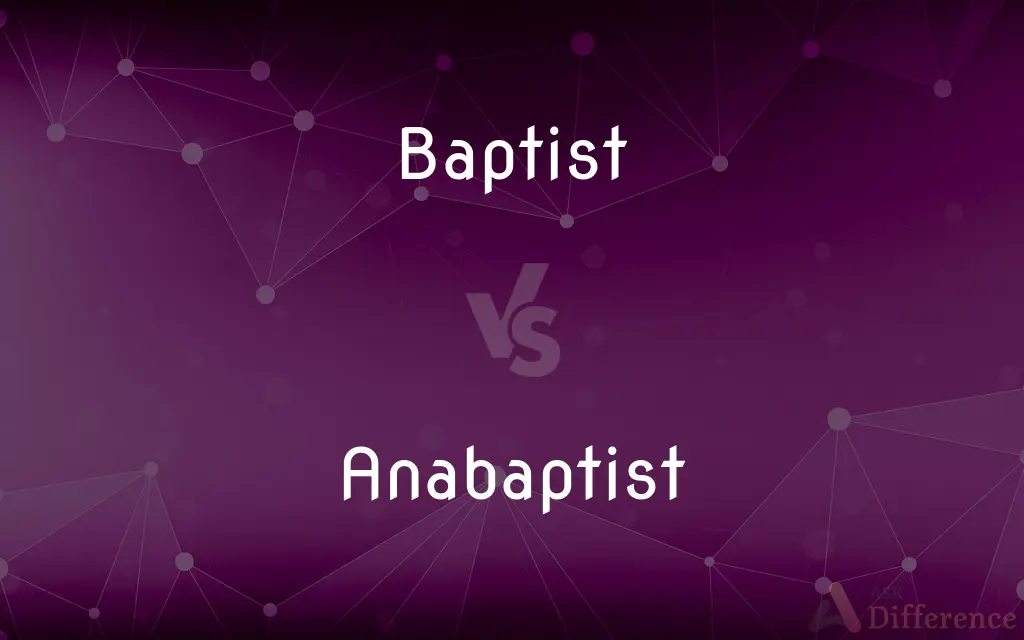Baptist vs. Anabaptist — What's the Difference?
Edited by Tayyaba Rehman — By Urooj Arif — Updated on March 16, 2024
Baptist churches emphasize believer's baptism by immersion, focusing on individual faith decisions. Anabaptists, rooted in the Radical Reformation, stress voluntary grown baptism and a commitment to nonviolence and simplicity.

Difference Between Baptist and Anabaptist
Table of Contents
ADVERTISEMENT
Key Differences
Baptists and Anabaptists both emerged from the Protestant Reformation but took distinct paths in their development and practices. Baptists, historically linked to the English Reformation of the 17th century, prioritize the believer's baptism by immersion, indicating a personal choice of faith. They generally support the separation of church and state, advocating for religious freedom. Anabaptists, originating in the 16th-century Radical Reformation in Europe, also practice grown baptism but place a stronger emphasis on the community of believers living apart from the world in a disciplined, communal lifestyle.
While both groups share the principle of believer's baptism, their understanding of church and society significantly diverges. Baptists tend to integrate more fully into society, often actively participating in social and political matters, whereas Anabaptists aim to live in separation from societal norms, focusing on community and the practice of nonviolence. This difference shapes their respective approaches to issues like military service, with many Anabaptists historically being pacifists.
In terms of church governance, Baptists usually adopt a congregational form of governance, where each local church is autonomous, making decisions independently of a higher church authority. Anabaptists, while also valuing local church autonomy, often have a more communal approach to decision-making, reflecting their emphasis on community life and mutual aid.
Theological emphasis also varies; Baptists are known for their strong emphasis on evangelism and individual conversion experiences. Anabaptists, while not discounting the importance of a personal faith journey, put a greater emphasis on the transformation of life and society according to Christian principles, often expressing skepticism towards the effectiveness of mere verbal evangelism without accompanying lifestyle changes.
Both traditions hold Scripture as the primary authority in matters of faith and conduct; however, Anabaptists traditionally give more weight to the teachings of Jesus and the New Testament, particularly the Sermon on the Mount, as a guide for Christian living, including issues of peace, justice, and community.
ADVERTISEMENT
Comparison Chart
Origin
17th century, England
16th century, Europe
Baptism
Believer's baptism by immersion
Believer's baptism, with an emphasis on a subsequent Christian life
Church and Society
Integration into society, support for separation of church and state
Separation from society, emphasis on community and nonviolence
Governance
Congregational autonomy
Communal decision-making, with a strong sense of community
Theological Emphasis
Evangelism, individual conversion
Transformation of life and society, following Jesus' teachings closely
Compare with Definitions
Baptist
Believer's baptism by immersion symbolizes faith and repentance.
John chose to be baptized in his local Baptist church to publicly profess his faith.
Anabaptist
Make decisions through community consensus.
Anabaptist churches frequently hold meetings to discuss and decide communal matters collectively.
Baptist
Support separation of church and state.
Baptists have historically advocated for religious freedom in political debates.
Anabaptist
Prioritize the teachings of Jesus and the New Testament.
Anabaptist teachings often revolve around the Sermon on the Mount as a model for living.
Baptist
Congregational church governance.
Each Baptist church independently decides its affairs and doctrine.
Anabaptist
Focus on nonviolence, pacifism, and social justice.
Anabaptists have been prominent in peace and reconciliation efforts worldwide.
Baptist
Emphasize individual conversion and evangelism.
Baptists often organize revival meetings to encourage personal faith decisions.
Anabaptist
Emphasize living in a community separate from worldly influences.
Anabaptist communities often share resources and live according to communal guidelines.
Baptist
Actively engage in societal and political matters.
Many Baptist denominations participate in social justice initiatives.
Anabaptist
An adherent of a Protestant religious movement that began in 16th-century Europe, viewing baptism solely as an external sign of a believer's conscious acceptance of faith, rejecting infant baptism, advocating the separation of church from state, and practicing simple living and the shunning of nonbelievers.
Baptist
A member of an evangelical Protestant church of congregational polity, following the Reformed tradition in worship and believing in freedom of conscience, separation of church and state, and baptism only of voluntary, conscious believers.
Anabaptist
Alternative form of Anabaptist
Baptist
Baptist One that baptizes.
Anabaptist
A name sometimes applied to a member of any sect holding that rebaptism is necessary for those baptized in infancy.
Baptist
A person who baptizes.
Anabaptist
Adherent of Anabaptism
Baptist
One who administers baptism; - specifically applied to John, the forerunner of Christ.
Baptist
One of a denomination of Christians who deny the validity of infant baptism and of sprinkling, and maintain that baptism should be administered to believers alone, and should be by immersion. See Anabaptist.
Baptist
Follower of Baptistic doctrines
Baptist
Of or pertaining to or characteristic of the Baptist church;
Baptist baptismal practices
A Baptist minister
Common Curiosities
What is the main difference between Baptist and Anabaptist beliefs?
The main difference lies in their approach to baptism, church and societal involvement, and emphasis on community and nonviolence.
How do Baptists and Anabaptists govern their churches?
Baptists use congregational autonomy, while Anabaptists employ a more communal decision-making process.
How do Baptists and Anabaptists approach social justice?
Both engage in social justice, but Anabaptists especially prioritize nonviolence and pacifism in their activism.
Do both Baptists and Anabaptists practice infant baptism?
No, both traditions practice believer's baptism, rejecting infant baptism.
Are all Anabaptists the same?
No, there are various Anabaptist groups, each with its own practices and beliefs, such as the Mennonites and Amish.
Can Anabaptists be involved in government or military service?
Traditionally, Anabaptists avoid these roles due to their commitment to pacifism and separation from worldly systems.
What is the significance of baptism for Baptists and Anabaptists?
For both, baptism is an outward expression of an inward faith, but Anabaptists also emphasize a life transformed according to Christian values.
How do Baptists view Anabaptists, and vice versa?
While there may be mutual respect for shared principles like believer's baptism, differences in theology and practice can lead to distinct identities.
How do Baptists and Anabaptists view the separation of church and state?
Baptists strongly support it, while Anabaptists focus more on living separately from state influences.
What theological emphases distinguish Baptists from Anabaptists?
Baptists emphasize evangelism and individual conversion, while Anabaptists focus on living out Jesus' teachings in community.
What historical events shaped the Baptist and Anabaptist movements?
The Reformation for Anabaptists and both the English Reformation and the Great Awakenings for Baptists were significant.
Do Baptists or Anabaptists have a central authority or hierarchy?
Generally, both traditions eschew a central authority in favor of local church autonomy or community consensus.
Is the Bible important to both Baptists and Anabaptists?
Yes, both hold Scripture as the primary authority but may emphasize different parts (e.g., Anabaptists focus on the New Testament teachings of Jesus).
Share Your Discovery

Previous Comparison
Milligram vs. Gram
Next Comparison
Betadine vs. IodineAuthor Spotlight
Written by
Urooj ArifUrooj is a skilled content writer at Ask Difference, known for her exceptional ability to simplify complex topics into engaging and informative content. With a passion for research and a flair for clear, concise writing, she consistently delivers articles that resonate with our diverse audience.
Edited by
Tayyaba RehmanTayyaba Rehman is a distinguished writer, currently serving as a primary contributor to askdifference.com. As a researcher in semantics and etymology, Tayyaba's passion for the complexity of languages and their distinctions has found a perfect home on the platform. Tayyaba delves into the intricacies of language, distinguishing between commonly confused words and phrases, thereby providing clarity for readers worldwide.
















































